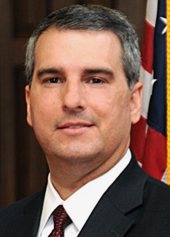Georgia’s seven-month march to a handheld cell phone ban ended in victory in the final hour of the 2018 legislative session. Gov. Nathan Deal signed the measure into law May 2, accompanied by relatives of the five nursing students who died in a horrific roadway crash.
The new Georgia distracted driving law means motorists must use hands-free devices or voice-activated technology in order to talk on their phones.
Fines were whittled down during legislative debate. Under changes made by the Senate to House Bill 673 (and approved by the House), first-time offenders will be fined $50 and receive 1 point vs. their license. Second offenses are $100 and 2 points, then $150 and 3 points.The law will allow for for single swipe or touch operation of wireless communications devices, as well as GPS use. The emphasis on holding of the devices will rule out a wide variety of typical smartphone behaviors, such as using social media, and watching or shooting video.
Georgia has a texting & driving ban, but a parade of witnesses told lawmakers that law is basically unenforceable.
The legislation came out of the House Distracted Driving Study Committee’s work on the issue. The distracted driving panel was established in response to soaring highway death rates. It began work in late August and delivered its endorsement of the handheld cell phone ban at the end of the year.
“This is the DUI issue of our generation,” said HB 673 sponsor Rep. John Carson says, who headed the panel.
At the law’s signing ceremony, Gov. Deal was surrounded by families of the Georgia Southern University nursing students who died in a 2015 crash in which a truck driver’s distraction was suspected. “Hopefully it will prevent the same kind of pain and tragedy being suffered by other families in the future,” he told their relatives.
The handheld cell phone law had faced what Lt. Gov. Casey Cagle called an “uphill battle.” But key endorsements from Cagle and his boss, Gov. Nathan Deal, gave the measure new life in the final weeks of the session.
The House and Senate exchanged versions of HB 673, with most attempts to water down the bill defeated. The Senate did reduce the original legislation’s fines, which would have approached $1,000 for serial offenders. The Senate also succeeded in giving first-time offenders a break — they can have citations voided if the driver shows proof a hands-free device has been purchased or acquired. (That loophole exists in a few other states.)
While there were ongoing concerns over lawmakers’ ability to get the legislation pushed through before adjournment, support was broad. The final House vote was 144-18 and the Senate tally was 52-1.
The distracted driving panel of seven Republicans and three Democrats had focused on the role cell phones play in the state’s rising number of highway fatalities.
More than 1,500 people died on Georgia roads last year. A State Patrol spokesman said many fatalities “are directly related to texting and driving or driving distracted.” Distractions also were blamed for a role in rising auto insurance rates in the state.
Harris Blackwood, director of the Governor’s Office of Highway Safety, told the distracted driving panel: “People are running into structures, they are running into other cars, they are departing the roadway, crossing the center line — and all those are symptomatic of distracted driving particularly texting.”
“Hands free is not a cure-all,” Blackwood said. “But it makes the law more enforceable.”
Bill sponsor Carson said: “The hands-free legislation does not take away your right to talk via your hands-free device; however, it may very well save your life or that of a loved one.”
The General Assembly’s approval no doubt was noted with relief in the cities of Smyrna and Marietta, which put off enforcement of their new handheld cell phone ordinances until after the legislative season, to see if a statewide law succeeded. They were the first cities in Georgia to adopt handheld cell phone laws for drivers. Both ordinances were set to go into effect in early April.
The move also is validation of sorts for former state Rep. Rahn Mayo, who made several attempts to toughen Georgia’s distracted driving laws, He was defeated in the Democratic primary two years ago.
This article updated May 2.
> Read more about Georgia’s distracted driving laws.
> Read the report from the House Study Committee on Distracted Driving.



Unfortunately, Michigan is still trying to kill as many motorists as possible by creating “laws” with no consequences.
As usual, a bunch of damn politicians who are more interested in raising revenue than saving lives. It doesn’t matter if the fines are $50, $1,000 or $10,000, a LAW is not going to stop this behavior. Their calculations on the fine are intended to maximize revenue, not reduce accidents. I’m surprised they didn’t set the fine at $49.99.
Only working with the carriers and auto manufacturer’s to come up with a technical solution will this be solved. Politicians and their laws are useless and this has been proved (on this topic) in every state that has passed this law. Check the distracted driving rates and the revenue in those states.
Have you ever been to Canada? Have you seen the multiple devices they have available for hands free driving?